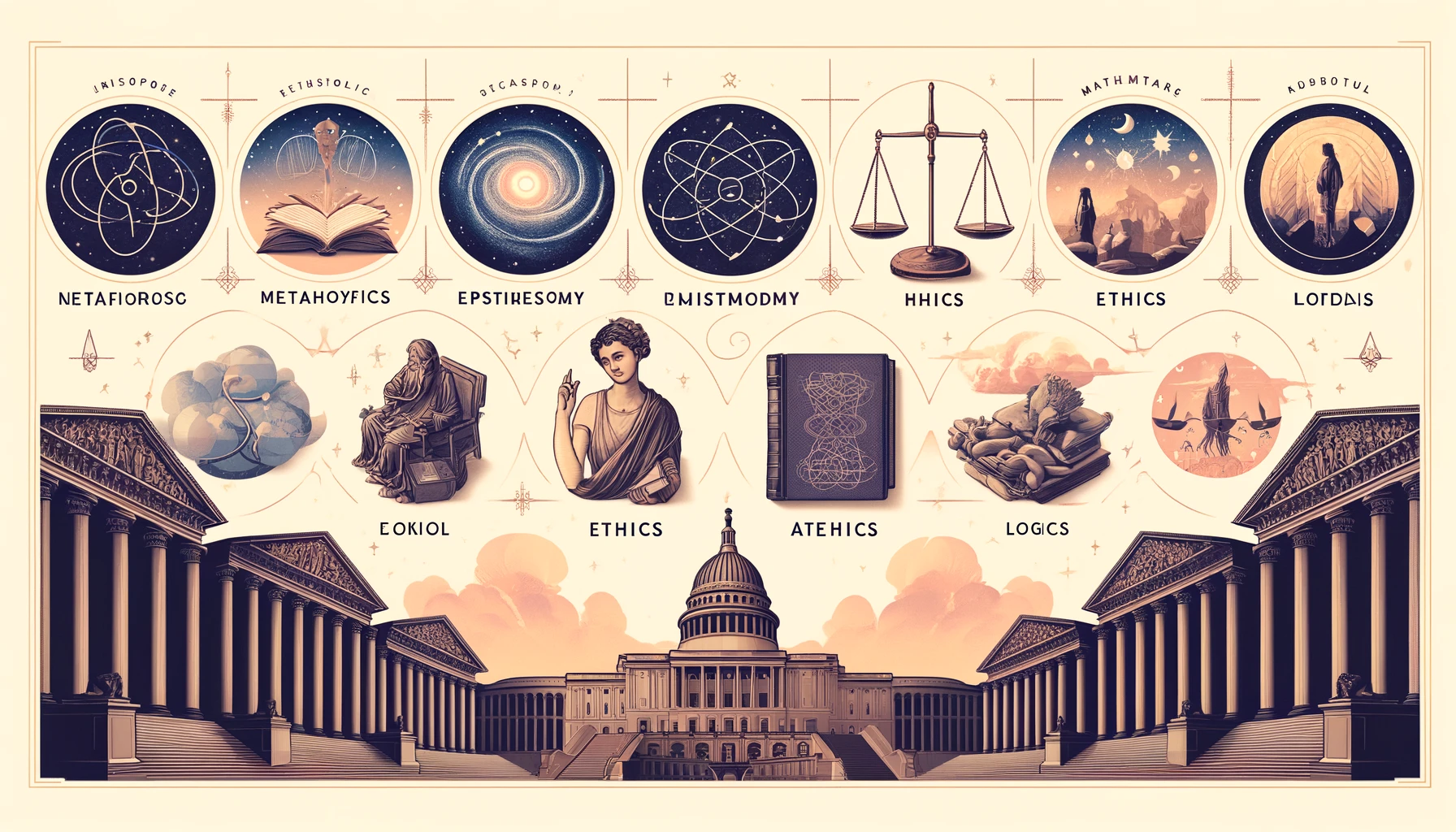Philosophy is an ancient and complex discipline that explores fundamental questions about existence, knowledge, morality, mind and language. Since its origins in Ancient Greece, philosophy has played a crucial role in the development of human thought, influencing diverse areas of knowledge and shaping the way we understand the world.
Definition of Philosophy
The word “philosophy” comes from the ancient Greek “philosophia”, which means “love of wisdom”. Philosophy is the study of fundamental questions about existence, knowledge, truth, values, mind and language. As an academic discipline, philosophy involves the critical and systematic analysis of concepts and arguments, seeking answers to deep and abstract questions.
History of Philosophy
The history of philosophy can be divided into several distinct eras, each with its unique characteristics and contributions:
Ancient Philosophy
Pre-Socratic Period:
Philosophers such as Thales, Anaximander and Heraclitus who explored cosmological and ontological questions.Classical Era:
Thinkers such as Socrates, Plato and Aristotle who laid the foundations of Western philosophy.
Medieval Philosophy
Religious Influence:
Christian, Islamic and Jewish philosophy, with figures such as Saint Augustine, Thomas Aquinas and Averroes.
Modern Philosophy
Renaissance to Enlightenment:
Descartes, Locke, Hume and Kant who focused on epistemology and science.
Contemporary Philosophy
19th and 20th centuries:
Movements such as existentialism, phenomenology, analytical and continental, with philosophers such as Nietzsche, Heidegger and Sartre.
Main Branches of Philosophy
Philosophy is divided into several main branches, each focusing on different aspects of human experience and reality. Main branches include:
Metaphysics
- The study of the nature of reality, existence, and the universe.
Epistemology
- The theory of knowledge, investigating its origin, nature and limits.
ethic
- The study of moral principles that govern human behavior.
Aesthetics
- The philosophy of art and beauty, examining the criteria of taste and appreciation.
Logic
- Analysis of the principles of correct reasoning and argumentation.
Political Philosophy
- The study of questions about government, justice, rights and the structure of societies.
Metaphysics
Metaphysics is one of the oldest and most fundamental branches of philosophy. She studies reality and existence, addressing issues that go beyond the physical and tangible. Among the main questions of metaphysics are: “What is reality?”, “What does it mean to exist?” and “What is the nature of being?” Philosophers such as Aristotle and Plato made significant contributions to this field, influencing generations of thinkers.
Epistemology
Epistemology is the area of philosophy that investigates the nature, origin and limits of knowledge. Epistemological questions include: “What is knowledge?”, “How do we know what we know?” and “What are the sources of knowledge?”. Descartes, Kant and Locke are some of the philosophers who made important advances in the theory of knowledge. Epistemology is crucial to philosophy as it establishes the foundations upon which knowledge and belief are based.
ethic
Ethics, or moral philosophy, is the study of the principles that govern human behavior. Ethical questions include: “What is good?”, “What is evil?” and “How should we act?” Ethics can be divided into several sub-disciplines, including normative ethics, which investigates norms of behavior; metaethics, which examines the nature of ethical judgments; and applied ethics, which deals with specific moral issues in contexts such as medicine, business and the environment. Philosophers such as Aristotle, Immanuel Kant, and John Stuart Mill have provided different approaches and theories on morality.
Aesthetics
Aesthetics is the branch of philosophy that focuses on the study of art, beauty and taste. She examines questions about what is considered beautiful or sublime and why certain works of art affect us emotionally. Aesthetic questions include: “What is art?”, “What makes something beautiful?” and “What is the role of art in society?” Philosophers such as Plato, Kant, and Hegel explored different theories about the nature of art and beauty.
Logic
Logic is the discipline that investigates the principles of correct reasoning. It is concerned with the structure of arguments and the validity of inferences. Logic can be divided into formal logic, which studies formal systems of argumentation, and informal logic, which examines arguments in the context of natural language. Aristotle is often considered the founder of logic, but modern philosophers such as Frege and Wittgenstein have also made significant contributions.
Political Philosophy
Political philosophy examines issues related to government, justice, rights and the organization of societies. Central questions include: “What is a just government?”, “What are the fundamental rights of individuals?” and “How should power be distributed?” Philosophers such as Plato, John Locke, Jean-Jacques Rousseau, and Karl Marx explored different theories about how best to organize society and the role of government.
Philosophy in the Modern World
In the modern world, philosophy continues to play a vital role in many areas, including science, politics, ethics, and culture. Modern philosophy addresses contemporary issues and social challenges, contributing to debates about technology, human rights, the environment and bioethics. The relevance of philosophy today is evidenced by its practical application in various disciplines and by its role in training critical thinkers and informed citizens.
Philosophy and Science
The relationship between philosophy and science is deep and complex. Philosophy of science investigates the foundations, methods, and implications of science. Questions such as “What constitutes a scientific theory?”, “What are the limits of science?” and “How do scientific theories evolve?” are central to this field. Philosophers such as Karl Popper and Thomas Kuhn have contributed to our understanding of science and scientific progress.
Philosophy and Religion
The intersection between philosophy and religion is another significant field. Philosophy of religion examines fundamental questions about the existence of God, the nature of faith, and the relationship between religion and ethics. Questions include: “Is there a God?”, “What is the nature of the divine?” and “How does religion influence morality?” Philosophers such as Saint Augustine, Thomas Aquinas, and Søren Kierkegaard made important contributions to the philosophy of religion.
Great Philosophers of History
The history of philosophy is marked by notable figures who made significant contributions to human thought. Some of the great philosophers include:
Socrates
Known for his method of questioning, Socrates sought the truth through critical dialogue. He left no writings of his own, but his ideas were preserved by his disciples, mainly Plato.
Plato
Student of Socrates and teacher of Aristotle, Plato founded the Academy in Athens. His best-known works, such as “The Republic”, explore justice, politics and the theory of ideas.
Aristotle
A disciple of Plato, Aristotle made fundamental contributions in several areas, including logic, metaphysics, ethics, politics, and biology. His work “Ethics of Nicomachean” is one of the main works on ethics.
Immanuel Kant
Kant is known for his work “Critique of Pure Reason”, where he explores the limits of human knowledge and introduces the idea that our perception of reality is shaped by our own minds.
Friedrich Nietzsche
A 19th century philosopher, Nietzsche challenged the moral and religious conventions of his time. His works, such as “Thus Spoke Zarathustra”, explore the idea of the superman and the death of God.
Other Contemporary Philosophers
In the 20th century, philosophers such as Jean-Paul Sartre, Martin Heidegger and Ludwig Wittgenstein made significant contributions to areas such as existentialism, phenomenology and the philosophy of language.
Conclusion
Philosophy continues to be a vital discipline, providing tools for analyzing and understanding the world in which we live. From its origins in Ancient Greece to its modern applications, philosophy has profoundly influenced science, politics, ethics, and culture. Through the study of philosophy, we develop critical thinking, argumentation and understanding skills, which are essential for facing the challenges of the modern world.








